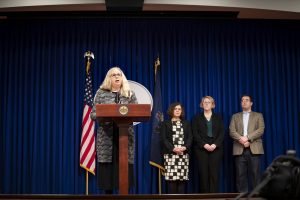
With more than 82,000 cases and 2,800 deaths worldwide due to coronavirus strain COVID-19, Bucks County and Pennsylvania health officials said they’re keeping tabs and preparing.
The Centers for Disease Control and Prevention (CDC) and Pennsylvania Department of Health have not reported any COVID-19 cases in the state as of Thursday afternoon. Nationwide, there are 59 cases with the majority of people coming back China or those who were passengers on a cruise ship in Japan.
Dr. David Damsker, director of the Bucks County Health Department, confirmed that the office is still monitoring Bucks Countians who traveled back from China recently for signs of illness.
“Since the start of this outbreak, we’ve taken a proactive approach to prepare and carefully monitor potential cases of COVID-19 in Pennsylvania,” Pennsylvania Health Secretary Dr. Levine said in a press conference on Wednesday. “As the Centers for Disease Control and Prevention (CDC) advised today, we need to be prepared for community spread of COVID-19. We are working to make sure our health systems, first responders and county and municipal health departments have the resources they need to respond.”
CDC officials have said they anticipate the number of cases to increase and urged Americans to be prepared.
“We know through our work with CDC in planning for disease outbreaks that it is best to prepare now.” Levine said. “The same family emergency plans and kits that we use to prepare for flu or norovirus, and even snowstorms and floods, are important now. Pennsylvanians should continue to help stop the spread of viruses by washing your hands, covering coughs and sneezes, cleaning surfaces and staying home if you are sick.”
Despite the state health secretary urging people to be prepared, it certainly does not mean residents should panic.
As of Thursday, chances of getting COVID-19 are rare in the U.S. and the vast majority of those who have had it survive.
Damsker said county health staff are meeting regularly to discuss COVID-19. From there, they are communication with partners and answering the many questions that are coming in.
Bucks County officials will begin their next phase of planning based on the latest CDC guidance, Damsker explained.
If a patient is confirmed in the Keystone State, health officials have a plan to continually update residents, Levine said.
“Symptoms of the COVID-19 in people who have been exposed can include fever, cough and shortness of breath. The symptoms may appear in as few as two days or as long as 14 days after exposure. Reported illnesses have ranged from people with little to no symptoms to people being severely ill and dying,” state health officials said.
Earlier this month, county health officials said they receive a daily list from the CDC via the Pennsylvania Department of Health of everyone who returned from China, and of that group, who has also visited Hubei Province, home of Wuhan, Central China’s most populous city and the epicenter of COVID-19. Those without symptoms of the illness are allowed to go home, where they get a call from their local health department.
Those who return from China are asked by county health officials to stay home for 14 days and limit any public activities.
While COVID-19 grabs the headlines, flu season in Keystone State is underway. The state health department said the flu activity in Pennsylvania remains high and has caused 66 deaths. In Bucks County, 2,447 people have confirmed flu cases as of last week.
The CDC offered the following tips to stay healthy:
- Avoid close contact with people who are sick.
- Avoid touching your eyes, nose, and mouth.
- Stay home when you are sick.
- Cover your cough or sneeze with a tissue, then throw the tissue in the trash.
- Clean and disinfect frequently touched objects and surfaces using a regular household cleaning spray or wipe.
- Follow CDC’s recommendations for using a facemask.
- CDC does not recommend that people who are well wear a facemask to protect themselves from respiratory diseases, including COVID-19.
- Facemasks should be used by people who show symptoms of COVID-19 to help prevent the spread of the disease to others. The use of facemasks is also crucial for health workers and people who are taking care of someone in close settings (at home or in a health care facility).
- Wash your hands often with soap and water for at least 20 seconds, especially after going to the bathroom; before eating; and after blowing your nose, coughing, or sneezing.
- If soap and water are not readily available, use an alcohol-based hand sanitizer with at least 60 percent alcohol. Always wash hands with soap and water if hands are visibly dirty.
LevittownNow.com and NewtownPANow.com Publisher Tom Sofield and New Hope Free Press Publisher Charlie Sahner contributed to this report.









